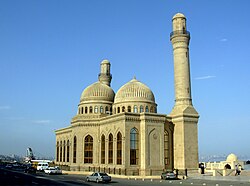
Back الدين في أذربيجان Arabic Azərbaycanda din Azerbaijani Религия в Азербайджан Bulgarian Religió a l'Azerbaidjan Catalan Crefydd yn Aserbaijan Welsh Religión en Azerbaiyán Spanish Religion en Azerbaïdjan French Religija u Azerbajdžanu Croatian Կրոնն Ադրբեջանում Armenian Agama di Azerbaijan ID
| Part of a series on |
| Azerbaijanis |
|---|
| Culture |
| Traditional areas of settlement |
| Diaspora |
| Religion |
| Language |
| Persecution |

Islam is the majority religion in Azerbaijan, but the country is considered to be the most secular in the Muslim world.[5] Estimates include 97.3% (The World Factbook, 2020)[6] and 99.2% (Pew Research Center, 2006)[7] of the population identifying as Muslim. Of these, a majority belong to the Shia branch (60%-65%), while a significant minority (35%-40%) are Sunni.[a][1][9] Traditionally, the differences between these two branches of Islam have not been sharply defined in Azerbaijan.
Most Shia Muslims in the country follow the Ja'fari school of Shia Islam, while Sunni Muslims typically adhere to either the Hanafi or Shafi'i school.[10] Due to many decades of Soviet atheist policy, Muslim religious affiliation in Azerbaijan is largely cultural and ethnic rather than religious. Shia Islam is prevalent in the western, central, and southern regions of the country. Traditionally, villages around Baku and the Lankaran region are considered Shia strongholds. In contrast, Sunni Islam is dominant in the northern regions.[10]
The rest of the population adheres to other faiths or nothing at all; they are not officially represented.[1] Other religious traditions that are followed by many in the country are the Russian Orthodox Church, and various other Christian denominations.
Like all other post-Soviet states formerly ruled by the Soviet Union, Azerbaijan is a secular state; Article 48 of its Constitution ensures the freedom of religion. A 1996 law states that foreigners have freedom of conscience but are denied the right to "carry out religious propaganda" (i.e., to prosyletize) under the threat of fines or deportation.[11] According to paragraphs 1-3 of Article 18 of the Constitution, religion acts separately from the government; each religion is equal before the law; and the propaganda of religions, abatement of human personality, and contradictions to the principles of humanism are prohibited.
- ^ a b c "Middle East :: Azerbaijan - The World Factbook". Central Intelligence Agency. Retrieved 2020-08-09.
- ^ S. Nielsem, Jorgen; Balciz Goyushov, Bayram, Altay (2013). "Azerbaijan". Yearbook of Muslims in Europe: Volume 5. Leiden, The Netherlands: Brill. p. 65. ISBN 978-90-04-25456-5.
{{cite book}}: CS1 maint: multiple names: authors list (link) - ^ Balci, Bayram (18 March 2013). "The Syrian Crisis: A View from Azerbaijan". Carnegie Endowment for International Peace. Archived from the original on 18 January 2022.
- ^ Greenger, Nurit (8 May 2017). "Azerbaijan a Destination Worthwhile. My week travel log in Azerbaijan - Day two". The Jerusalem Post. Archived from the original on 19 January 2023.
- ^ "Islam and Secularism: the Azerbaijani experience and its reflection in France". PR Web. Archived from the original on February 14, 2015. Retrieved 2013-08-16.
- ^ "Middle East :: Azerbaijan — The World Factbook". Central Intelligence Agency. Retrieved 2023-07-09.
- ^ "Interactive Data Table: World Muslim Population by Country". Pew Research Center. 7 October 2009. Retrieved 2020-08-09.
- ^ "Sunni and Shia muslims pray together in Azerbaijan's Heydar Mosque".
- ^ Mammadli, Nijat (7 June 2018). "Islam and Youth in Azerbaijan". Baku Research Institute. Archived from the original on 20 April 2023.
quote:"Also, according to rough estimates, Shiites constitute 60-65% of the Muslim population, and Sunnis – 35-40%."
- ^ a b Mammadli, Nijat (7 June 2018). "Islam and Youth in Azerbaijan". Baku Research Institute. Retrieved 20 April 2023.
- ^ Corley, Felix (November 1, 2005). "Azerbaijan: Selective obstruction of foreign religious workers". Forum 18. Retrieved 2006-06-18.
Cite error: There are <ref group=lower-alpha> tags or {{efn}} templates on this page, but the references will not show without a {{reflist|group=lower-alpha}} template or {{notelist}} template (see the help page).